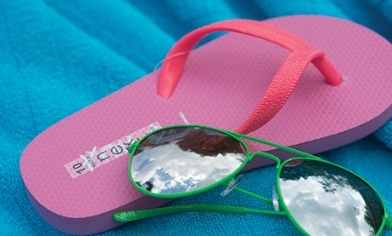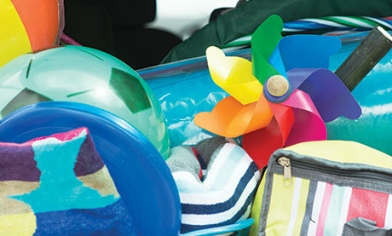Taxis and rickshaws
It’s happened to all of us at least once. Climbing into a taxi, reaching your destination in 5 minutes, and then being presented with an outrageous fare.
You don’t want to cause a fuss (because that’s not what us Brits do) so you pay the driver and fume for the rest of the night.
To avoid this happening, agree a price before you set foot in the cab. To dodge the language barrier, carry a pen and paper handy – write down the fare you’ve both agreed upon for your entire group, and then carry it with you in case of a dispute.
Don’t risk your luggage being held hostage – if you can, keep bags to hand rather than in the locked boot of a taxi.

Friendly strangers
If anyone approaches you on the street – a stranded traveller needs cash to get home, or an attractive local who’s fascinated by life in the UK – chances are, they’re after your money.
A common scam is a friendly local inviting tourists out for a drink in a bar or nightclub. They, or some good-looking friends, will join you and order some very expensive drinks (probably a few bottles of bubbly), then scarper – leaving you to sort out the bill that’ll run into the hundreds or thousands, while security hassle you until you pay up.
The bottom line is – be wary of anyone who takes a sudden interest in you, and is unusually friendly.
Not having change
‘$3.12 for a hot dog? But I’ve only got a 10 dollar note!’
This is common with street vendors and taxi drivers, taking advantage of the fact that most tourists will only have high-value notes.
Taxi drivers or street vendors may insist that they don’t have change, and that they need to be paid the exact amount – knowing that you won’t have any change. Even if you have smaller bills, you may end up paying extra.
Sometimes, sellers may ‘forget’ to give you your change. They might distract you with small talk, a bit of local gossip, and then end with a smile and a ‘thank you!’ Once you’ve left, you won’t be able to get your change back – so make sure you don’t get distracted.
Another common scam is to drop your change ‘accidentally’ – and then swap the coins for lower value but similar looking ones. To avoid getting scammed, keep a variety of change with you – and try to pay with exact change whenever possible.
Restaurant bills

Wait a minute – you didn’t order any filet mignon. What exactly is going on here?
Always check the bill before you pay. If you don’t get an itemised receipt, ask for one – the restaurant has to be able to provide one.
Find out about local charges and customs before you go – read our guide on how much to tip on holiday. A lot of European countries include service charge as part of the bill. There can also be small extra charges – like Italy’s bread charge ‘Pane e coperto’. These aren’t scams, so do your research before you go.
Some dodgy restaurants offer tourists one menu, overcharge them, then show a second menu with higher prices if the tourist recognises they’ve been ripped off. If you’re not quite sure about the place you’re eating at, hold on to the first menu you’ve been given.
Street vendors
Nobody wants to pay 50 euros for an ice cream. So when you’re buying from street vendors, request an exact price before you hand over any money.
Dodgy street vendors will often list prices by weight, so you’ll only find out the real cost when the food is all served up. If you find yourself asked to pay over the odds for something, don’t feel pressured, don’t agree to buy anything – just walk away.
Pickpockets
Thieves are very good at manipulating and distracting travellers, getting their guard down and then lifting their valuables. They may engage you in conversation, barge past you, or reach into your bag while you’re not looking.
Pickpockets often work in teams – one may distract you, while the other reaches into your bag. Be wary of conversations with strangers, and watch out for any unwanted physical contact.
Shopping bags, outside pockets and backpacks are all easy targets – so don’t let your guard down in crowded areas, carry money and passports in hard to reach places, and leave as many valuable items as you can in the hotel safe (if that’s an option).
Be aware of the techniques thieves and pickpockets overseas could use to try and steal your passport.
Car hire charges
Before you drive the car away, inspect it – if there are any bumps or scratches, take pictures and make sure this is noted on the paperwork before you drive away.
If you’re given an unexpected upgrade, make sure you find out what this is going to cost – because it could mean a big, unexpected extra cost. If it will mean an extra charge, ask for a smaller car and a refund for the difference.
Paying in the local currency
If you pay by card, and staff ask if you want to pay in the local currency or in pounds sterling, choose the local currency. This is because the pounds sterling displayed may be at a very poor exchange rate – meaning you’re paying quite a bit more for the exact same item.
If paying in the local currency isn’t an option, choose cash. Chances are you’ll save money. An easy way to keep track of your spending abroad is with a prepaid travel money card.
Passport as security
Some vehicle hire places will demand your passport as a security deposit on your vehicle. Never, ever hand over your passport. Because when you come back, they’ll claim you damaged the vehicle – and hold your passport hostage until you pay an outrageous fee to get it back.







